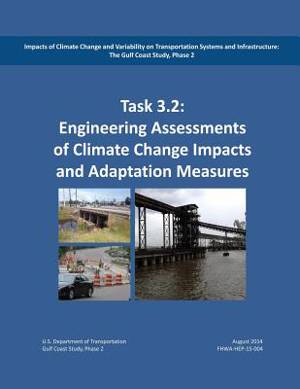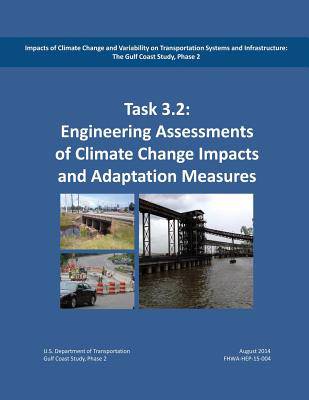
Wil je zeker zijn dat je cadeautjes op tijd onder de kerstboom liggen? Onze winkels ontvangen jou met open armen. Nu met extra openingsuren op zondag!
- Afhalen na 1 uur in een winkel met voorraad
- Gratis thuislevering in België vanaf € 30
- Ruim aanbod met 7 miljoen producten
Wil je zeker zijn dat je cadeautjes op tijd onder de kerstboom liggen? Onze winkels ontvangen jou met open armen. Nu met extra openingsuren op zondag!
- Afhalen na 1 uur in een winkel met voorraad
- Gratis thuislevering in België vanaf € 30
- Ruim aanbod met 7 miljoen producten
Zoeken
Impacts of Climate Change and Variability on Transportation Systems and Infrastructure
The Gulf Coast Study, Phase 2: Engineering Analysis and Assessment (Task 3.2)
Federal Highway Administration, U S Department of Transportation
Paperback | Engels
€ 52,45
+ 104 punten
Omschrijving
Facility managers, transportation planners, and elected officials are increasingly concerned about the resilience of transportation infrastructure to a range of threats, including the threats posed by climate change and extreme weather. However, the information and tools necessary to understand, evaluate, and rank vulnerabilities remains scarce. This is particularly true as it relates to specific facilities and the assets that constitute a facility; even more scarce is information and data regarding adaptation (i.e., risk mitigation) measures, their efficacy in reducing risks, and the returns on investment that might be expected if adaptation strategies are adopted. Because many assets (e.g., rail lines, bridges, and piers) are expected to provide service for 100 years or longer, consideration of medium, and long-term climate threats is essential to ensuring safe and effective transportation services at all levels of authority (i.e., federal, state, county, and municipal) and for both publicly and privately managed assets. Acknowledging the importance of establishing systematic, transferrable approaches for assessing and addressing vulnerability to climate and weather risks, the USDOT's Center for Climate Change and Environmental Forecasting commissioned a comprehensive, multiphase study of climate change impacts on transportation in the Central Gulf Coast region. This study is the first such study of its magnitude in the United States and represents an important benchmark in the understanding of what constitutes an effective transportation system adaptation effort. The Gulf Coast region was selected as the focal point due to its dense population and complex network of transportation infrastructure, as well as its critical economic role in the import and export of oil, gas, and other goods. The Gulf Coast Study includes two phases: Phase 1 - investigated potential climate change risks and impacts on coastal ports, road, air, rail, and public transit systems. The study assessed likely changes in temperature and precipitation patterns, sea level rise, and increasing severity and frequency of tropical storms. Phase 1 then explored how these changes could impact transportation systems. Phase 2 - The purpose of Phase 2 is to provide a more detailed assessment of the vulnerability of the most critical components of the transportation system to weather events and long-term changes in climate. This work is being conducted on a single metropolitan area, the Mobile, Alabama region, with the intention of making the processes used in the study replicable to other areas.
Specificaties
Betrokkenen
- Auteur(s):
- Uitgeverij:
Inhoud
- Aantal bladzijden:
- 348
- Taal:
- Engels
Eigenschappen
- Productcode (EAN):
- 9781507886182
- Verschijningsdatum:
- 7/02/2015
- Uitvoering:
- Paperback
- Formaat:
- Trade paperback (VS)
- Afmetingen:
- 216 mm x 279 mm
- Gewicht:
- 807 g

Alleen bij Standaard Boekhandel
+ 104 punten op je klantenkaart van Standaard Boekhandel
Beoordelingen
We publiceren alleen reviews die voldoen aan de voorwaarden voor reviews. Bekijk onze voorwaarden voor reviews.











